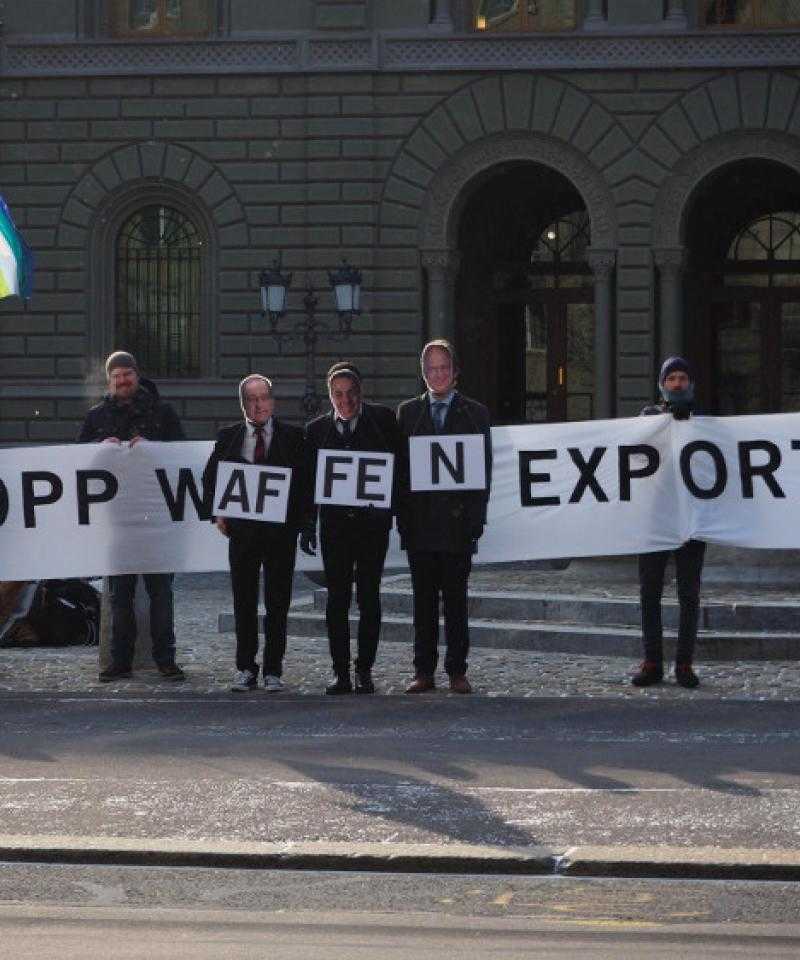War, and how Switzerland profits

Switzerland is well known for its contribution to international dialogue, peacekeeping and diplomatic efforts. The promotion of peace and human rights is a priority of Swiss foreign policy. But consistency doesn’t seem to be a highly held value in the small Alpine country; not only do Swiss financial institutions - like private and public banks, insurance companies and pension funds - invest billions in arms producing companies all over the world, Swiss-made weapons and military technology are used in many conflicts.
The Group for a Switzerland without an Army (GSoA), the largest and most active pacifist organisation in Switzerland, refuses to accept the explanation that the business with war and its victims is inevitable in the times of globalized trade and border crossing finance marketing. We take action to build public awareness, and point out the fatal involvement of the Swiss finance and weapons industries in the death and eviction of millions of people.
Using the tools that the political system in Switzerland provides, the GSoA launched a referendum in order to add a paragraph to the Swiss constitution which prohibits the funding of arms producing companies through banks, pension funds and trusts. The most recent data shows that such a ban is necessary: The big private banks UBS and CS both hold investments in nuclear weapons, investing $4,015 million and $784 million respectively, they both appear in the hall of shame of the “Don’t bank on the Bomb” report from March 2018. When it comes to the funds that flow to companies that produce other other weapons, it’s almost impossible to find any data. Nevertheless, since many arms producing companies are included in stock market indexes such as the MSCI WORLD – and Swiss financial institutions are common investors in such funds – billions of Swiss francs end up in the accounts of the weapon producers.
Even the Swiss national bank holds investments in Raytheon of almost $140 million – shares which grow in value the more missiles from their production are launched in conflicts worldwide. The Swiss national banks responds to public criticism of such investments with the scandalous excuse that Raytheon doesn’t produce any internationally banned weapons and therefore has to be treated as any other company – totally ignoring the deathly effects of non-banned weapons, and also the fact that Raytheon used to produce cluster munition just upon a couple of years ago. The referendum launched by the GSoA will provide the electors with the possibility to say “no” to such business.
As for Switzerland’s own weapons industry, representatives of 13 arms producers reached out to the government last year, expressing their concern that the existing restrictions to export to countries at civil war was endangering employment, and would put the Swiss industry behind international competition. In plain language: they are asking the government to change the Swiss weapon export regulations to allow sales to countries suffering from civil war. The industry makes up only 0.15% of the total export volume of Switzerland, and the arms industry is one of the least important exporters. The arrogance the industry displays is totally disproportional to its meaning for Switzerland, and the government seems willing to comply with these wishes without even listening to the civil society. The GSoA aims to display the extreme influence of the arms lobby in Switzerland and wants to remind both government and public of the country’s commitment to peace.
Add new comment